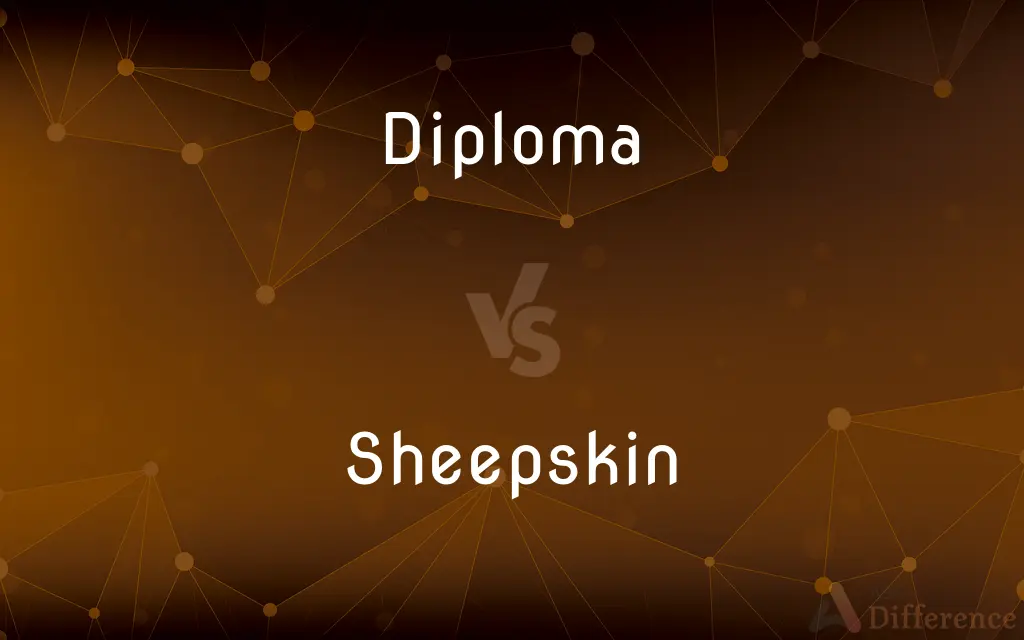Diploma vs. Sheepskin — What's the Difference?
Edited by Tayyaba Rehman — By Maham Liaqat — Updated on April 5, 2024
A diploma is a certificate awarded by an educational institution, while "sheepskin" colloquially refers to the same, highlighting its traditional material.

Difference Between Diploma and Sheepskin
Table of Contents
ADVERTISEMENT
Key Differences
A diploma is a formal document certifying the completion of a particular course of study or the attainment of an academic degree. It represents a significant achievement in an individual's education, signaling competence and readiness to pursue professional opportunities or higher education. On the other hand, "sheepskin" is an informal term that historically refers to diplomas, as they were once commonly printed on parchment made from sheepskin. This term emphasizes the traditional aspect and material of the diploma, rather than its academic significance.
While diplomas are recognized universally across educational systems and hold significant value in academic and professional realms, the term "sheepskin" serves more as a nostalgic or colloquial reference to the physical diploma. Whereas diplomas can vary widely in appearance, format, and the details they contain based on the awarding institution, the use of actual sheepskin for printing diplomas is now rare, making "sheepskin" a metaphorical expression.
The importance of a diploma lies not only in its representation of academic achievement but also in its utility for career advancement and further education opportunities. It is a prerequisite for entry into many professions and postgraduate programs. In contrast, referring to a diploma as a "sheepskin" does not change its value but may be used to either affectionately diminish the seriousness of the achievement or, conversely, to underscore the traditional prestige associated with completing a course of study.
In contemporary settings, diplomas are often printed on paper or synthetic materials, reflecting advancements in printing technology and changes in material preferences. The transition away from sheepskin highlights environmental considerations and the need for durability and cost-effectiveness. Meanwhile, the term "sheepskin" persists in colloquial language, capturing a sense of tradition and the historical significance of academic achievements.
The process of earning a diploma involves completing a set curriculum and meeting the requirements set forth by the educational institution. This could include passing examinations, completing coursework, and participating in other academic activities. On the other hand, the acquisition of a "sheepskin" is a symbolic culmination of these efforts, a nod to the times when receiving such a document was a more tactile, materially unique experience, differentiating it from other forms of certification or recognition.
ADVERTISEMENT
Comparison Chart
Definition
A certificate awarded by an educational institution.
Colloquial term for a diploma, historically referring to its sheepskin parchment.
Significance
Represents academic achievement and qualifications.
Emphasizes the traditional material and historic aspect of diplomas.
Usage
Universal in academic and professional contexts.
Informal and nostalgic, less common in formal contexts.
Material
Nowadays, usually paper or synthetic materials.
Historically, made of sheepskin parchment.
Purpose
Serves as proof of education, qualifications for employment, or further study.
Same as diploma, with an added traditional connotation.
Compare with Definitions
Diploma
Often required for career advancement.
A teaching diploma is necessary to work in most schools.
Sheepskin
Reflects traditional practices in diploma presentation.
Once, every graduate received their degrees on actual sheepskin.
Diploma
Reflects a standardized measure of achievement.
Achieving a high school diploma is a significant milestone.
Sheepskin
Sometimes used metaphorically to represent educational achievements.
Landing that job was easy with a sheepskin from such a prestigious university.
Diploma
Indicates academic or professional qualifications.
His diploma in engineering opened many job opportunities.
Sheepskin
Informal term for a diploma, emphasizing its material.
He joked about finally getting his sheepskin after years of study.
Diploma
A certificate awarded for completing a course of study.
She framed her diploma and hung it in her office.
Sheepskin
Used colloquially to denote graduation.
After years of hard work, she's finally earned her sheepskin.
Diploma
Issued by schools, colleges, and universities.
The university awards diplomas to all graduates.
Sheepskin
Carries a nostalgic or affectionate tone.
My grandfather showed me his sheepskin from the 1940s.
Diploma
A diploma is a certificate or deed issued by an educational institution, such as college or university, that testifies that the recipient has successfully completed a particular course of study. The word diploma also refers to an academic award which is given after the completion of study in different courses such as diploma in higher education, diploma in graduation or diploma in post-graduation.
Sheepskin
Sheepskin is the hide of a sheep, sometimes also called lambskin. Unlike common leather, sheepskin is tanned with the fleece intact, as in a pelt.
Diploma
A document issued by an educational institution, such as a university, testifying that the recipient has earned a degree or has successfully completed a particular course of study.
Sheepskin
The skin of a sheep either tanned with the fleece left on or in the form of leather or parchment.
Diploma
A certificate conferring a privilege or honor.
Sheepskin
(Informal) A diploma.
Diploma
An official document or charter.
Sheepskin
(uncountable) The skin of a sheep, especially when used to make parchment or in bookbinding.
Diploma
A document issued by an educational institution testifying that the recipient has earned a degree or has successfully completed a particular course of study.
Get a diploma
Study for a diploma
Hold a further-education diploma
Sheepskin
A diploma.
Diploma
A letter or writing, usually under seal, conferring some privilege, honor, or power; a document bearing record of a degree conferred by a literary society or educational institution.
Sheepskin
The tanned skin of a sheep with the fleece left on, especially when used for clothing, rugs, etc.
Diploma
A document certifying the successful completion of a course of study
Sheepskin
The skin of a sheep; or, leather prepared from it.
Sheepskin
A diploma; - so called because usually written or printed on parchment prepared from the skin of the sheep.
Sheepskin
Tanned skin of a sheep with the fleece left on; used for clothing
Sheepskin
Skin of a sheep or goat prepared for writing on
Sheepskin
A document certifying the successful completion of a course of study
Common Curiosities
What is a diploma?
A formal document certifying completion of a specific education level or course.
Why is a diploma sometimes called a sheepskin?
Historically, diplomas were made of sheepskin parchment, leading to the colloquial term.
Are diplomas still made from sheepskin?
Rarely, modern diplomas are typically printed on paper or synthetic materials.
Is a diploma important for employment?
Yes, many employers require diplomas to verify educational background and qualifications.
Does the term "sheepskin" have any practical relevance today?
It’s mostly used nostalgically or informally, with little practical relevance to modern diploma materials.
How long does it take to earn a diploma?
The duration varies depending on the level of study and the program's requirements.
What difference does a diploma make?
It can significantly impact one's career opportunities and educational prospects.
Are digital diplomas becoming more common?
Yes, with technological advancements, digital or electronic diplomas are increasingly common.
What is the significance of a diploma?
It signifies academic achievement and is essential for career and further education opportunities.
Can I use "sheepskin" in formal applications?
It’s best to use "diploma" in formal contexts, as "sheepskin" is considered informal or colloquial.
How do I get a diploma?
By completing the required course of study and meeting all criteria set by the educational institution.
Why might someone refer to their diploma as a sheepskin?
For humor, nostalgia, or to reference the traditional aspect of academic achievements.
What's the value of a sheepskin in today's job market?
While the term "sheepskin" might be used colloquially, the value lies in the academic achievement it represents.
Is there a difference in recognition between diplomas and degrees?
A diploma is a type of degree, but the terms can signify different levels of academic achievement depending on the context.
Can I replace my diploma if it's lost?
Most educational institutions offer a process to request replacement diplomas.
Share Your Discovery

Previous Comparison
Immerge vs. Submerge
Next Comparison
Dress vs. SuitAuthor Spotlight
Written by
Maham LiaqatEdited by
Tayyaba RehmanTayyaba Rehman is a distinguished writer, currently serving as a primary contributor to askdifference.com. As a researcher in semantics and etymology, Tayyaba's passion for the complexity of languages and their distinctions has found a perfect home on the platform. Tayyaba delves into the intricacies of language, distinguishing between commonly confused words and phrases, thereby providing clarity for readers worldwide.














































